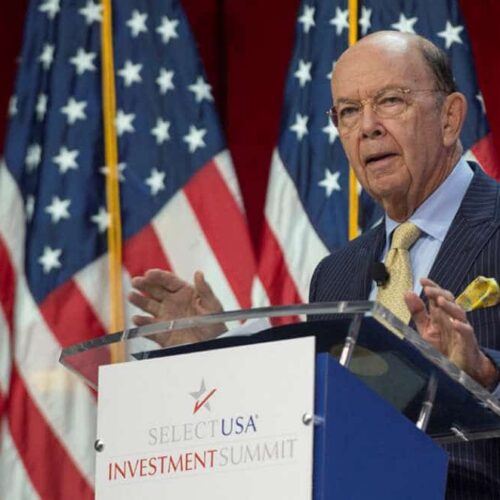Introduction
A nonpartisan watchdog has accused U.S. Commerce Secretary Wilbur Ross of violating conflict-of-interest laws as well as statutes governing false statements and omissions — and is asking the department’s inspector general to investigate.
The 115-page complaint by the Campaign Legal Center cites reporting by the Center for Public Integrity and several other news organizations in calling for an extensive inquiry into Ross’ handling of his complex personal holdings while in office.
“We conducted a detailed review of public records and found reason to suspect Ross violated the criminal conflict-of-interest law,” Campaign Legal Center Ethics Counsel Delaney Marsco said. “It’s imperative that the inspector general get to the bottom of this. There’s a lot of smoke, and we need to know if there’s fire.”
Ross failed to sell multiple financial holdings, including millions of dollars’ worth of stock in Invesco Ltd., until months after he was required to do so.
In a statement last month, Ross said he had “made inadvertent errors in completing the divestitures required by my ethics agreement.”
Also last month, the Center for Public Integrity reported that Ross’ Invesco stock value increased by at least $1.2 million and as much as $6 million between the end of May, when Ross was supposed to divest, and late December, when he actually did.
The Campaign Legal Center complaint notes that in 2017, an Invesco subsidiary headed by Ross until he entered government, acquired an interest in Chinese steel. In April 2017, Ross announced an investigation into whether the U.S. should impose a tariff on steel imports, something the Campaign Legal Center said could have a direct and predictable effect on Ross’ financial interests, given his continued ownership of Invesco stock.
The complaint questions Ross’ assertion that he believed the stock had been sold.
“Ross may well have had a reason for delaying the divestiture of this stock,” the complaint said, citing the Center for Public Integrity’s calculations of the stock’s increased value.
Update, 6:17 p.m., Aug. 13: Ross’s attorney, Theodore Kassinger, said in an email to the Center for Public Integrity that Ross “has not violated any conflict of interest law or regulation.”
Kassinger continued: “[Ross] has not participated personally and substantially in, nor taken any action in regard to a particular matter that would have had a direct and predictable effect on his financial investments. He continues to follow the guidance of Commerce Department ethics officials regarding the matters in which he is personally involved. He has divested a very substantial part of the investments he held when he assumed the office of Secretary, and he has pledged to divest other remaining holdings even though he is not obligated to do so.”
Commerce Department officials did not return requests for comment.
In July — responding to the Center for Public Integrity’s reporting — the Commerce Department issued a statement that said: “Nothing regarding Invesco has come before the Secretary. Additionally, Invesco is not regulated by the Commerce Department. Regardless, as the Secretary had been a former employee of Invesco, Invesco was on the list of companies for which he would have been required to recuse himself. It is a mischaracterization to imply that the reason why the shares were not sold was anything other than an inadvertent error and as soon as he discovered the problem, Secretary Ross notified the Commerce Department Ethics officials and promptly sold the shares.”
Ross himself noted that he “mistakenly believed that all of my previously held Invesco stock was sold” before he assumed the commerce secretary position, according to a note in the transaction report he filed with federal ethics officials. “In December 2017, I discovered that the previously held stock had not been sold. I then promptly sold these shares,” he wrote. He attributed the confusion to a separate arrangement with the company regarding divesting his unvested stock.
The Campaign Legal Center complaint also raises several other concerns, including one regarding Ross’ involvement in Trump administration steel tariffs, given Ross’ ownership of stock in The Greenbrier Companies, a manufacturer of rail cars. Ross has also been involved in negotiating trade agreements that could potentially affect the value of some of his other holdings, notably shipping company Navigator Holdings.
The acting head of the Office of Government Ethics last month criticized Ross’ handling of his divestitures in an unusually strong letter, writing that his failure to divest by the deadline “created the potential for a serious criminal violation on your part and undermined public confidence.”
In response, Ross said that he was directing the sale of all of his equity holdings, with proceeds to be placed in U.S. Treasury securities in order to “maintain the public trust.” It isn’t clear whether those transactions have yet taken place. As of Monday morning, no paperwork reflecting those transactions had yet been made public by the Office of Government Ethics.
In addition to the Campaign Legal Center, other watchdog groups, including Democracy 21 and Citizens for Responsibility and Ethics in Washington have called for investigations into Ross.
Sen. Ron Wyden, D-Oregon, the ranking member of the Senate Finance Committee, has asked the Department of Justice to investigate. Sen. John Thune, R-S.D., has asked the Commerce Department inspector general to examine whether Ross violated conflict of interest laws.
Read more in Money and Democracy
Money and Democracy
As intolerance grows, targeted religious groups join forces
The rise in religious hate crimes is prompting different religious groups to take measures to protect and help other people attacked for their faith.
Money and Democracy
Millions are victims of hate crimes, though many never report them
An investigation of a growing climate of hate in the United States through national crime victimization data analysis and on-the-ground reporting in 36 states




Join the conversation
Show Comments